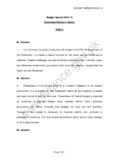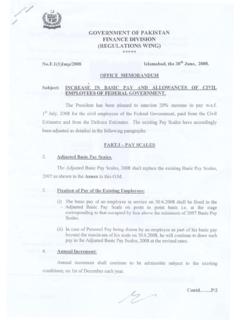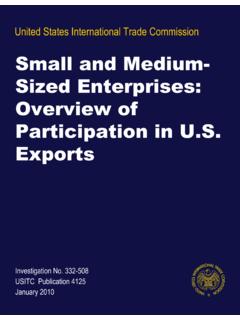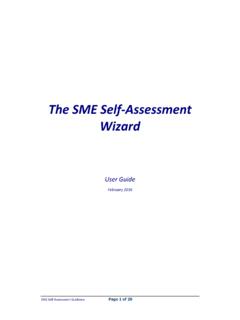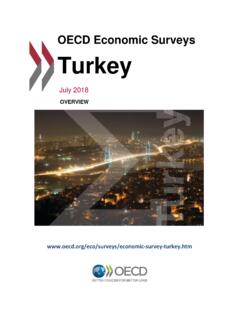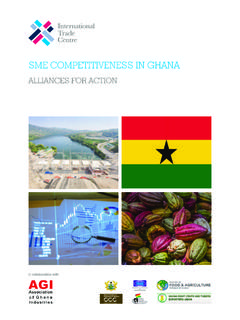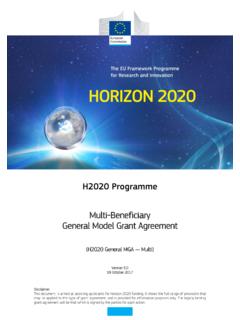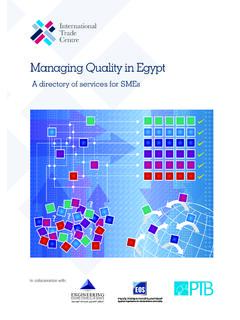Transcription of Overview of the Economy - finance.gov.pk
1 Overview of the Economy Pakistan has made great strides in improving its economic outcomes and reducing its macroeconomic vulnerability in the recent years. As a result economic growth has continued to gain traction, albeit at varying speeds across the sectors, founded on the government s commitment to higher growth and low inflation. GDP continued to grow above 5 percent in each of the last 2 years reaching percent highest in 13 years in the outgoing fiscal year FY2018 and 4 percent in each of the three preceding years. This achievement is remarkable as it has been accomplished in the face of global head winds. This year s strong economic growth has been underpinned by supportive macroeconomic supply and demand policies, renewed confidence in the private sector and fiscal discipline.
2 Major international institutions anticipate that global economic growth will increase from previously subdued levels, which is a welcome development for a broadly favourable future outlook in Pakistan as well. The most important achievements of the outgoing fiscal year include the fastest pace in real GDP growth on the back of strong growth in agriculture, impressive growth in manufacturing as well as in services. All macroeconomic indicators exhibited remarkable progress; such as contained inflation, healthy credit flows to private sector, recovery in exports, slowdown in imports, lowest policy rate, increase in FDI and remittances, strengthening of the banking sector, uninterrupted energy supplies to the industrial sector, higher LSM growth, enhanced incorporation of companies, encouraging response from the capital market, increase in per capita income, impressive revenue collections, higher PSDP spending, progress on CPEC projects, and an added impetus coming from the global economic recovery.
3 The World Bank in its report has stated that Pakistan s economic growth increased from percent in 2017 to percent in 2018 supported by major infrastructure projects and low interest rates. Major impetus came from improved performance of services and agriculture sector. Industrial sector also saw some recovery. As a major development, Pakistan has ranked No. 1 in South Asia in private infrastructure investment, thus becoming one of the world's top five private participation in infrastructure (PPI) investment destinations. The growth across different sectors of the Economy has attracted major international companies towards Pakistan, where they see immense potential, a huge consumer market, strategic location and macroeconomic stable environment achieved during the last five years.
4 The IMF has also stated that Pakistan s Economy is showing strong signs of rising growth and price stability. The near term outlook for economic growth is broadly favourable supported by improved power supply, investment relating to the China-Pakistan Economic Corridor (CPEC), strong consumption growth and ongoing recovery in agriculture. Apart from these positive developments, risks/challenges remain on domestic and external fronts, particularly the unfavorable BOP position due to a widening Current Account Deficit (CAD) along with less than expected foreign inflows and a decline in exports in the last two to three years. Slow global growth in international trade flows was an external factor that contributed to the low Pakistan Economic Survey 2017-18 ii export growth.
5 However, this declining trend has started to fade out due, on the one hand, to government s supportive initiatives for export growth along with efforts to limit the import of luxury goods and a recovery of the global Economy on the other. The current fiscal year has seen continued exports growth in all 9 months. Exports increased by percent while imports have slowed down to percent as compared to 48 percent at the start of current financial year. The government has been able to get GSP Plus preferential tariffs scheme renewed from the European Union for the next two years which will help boost exports, going forward. The present government s vision is focused on the diversification of exports to include new products/services and partners, increased involvement in global value chains, increasing foreign direct investment greater revenue collection, transparency in trade transactions and expanded participation of small and medium-sized enterprises in international trade.
6 SBP has prepared a comprehensive Policy for Promotion of SME Financing which was launched by Prime Minister of Pakistan on December 22, 2017. The policy will enhance the share of SME financing in total private sector credit from percent as of December 2017 to 17 percent by 2020. Similarly, cognizant of the global developments in digital trade, the Ministry of Commerce is finalizing a Policy Framework for development of Commerce/digital trade in the country. The Framework is being developed to deal with Regulatory regime, Payment Infrastructure, Logistics and Taxation issues related to E-Commerce. E- Commerce is not only a growing global industry, it is also one of the important pillars on which an increasing share of future business, financial and trading transactions will depend and there is a dire need to develop it in Pakistan.
7 Digital platforms have changed the economics of doing business across borders by reducing costs of international transactions enabling Micro, Small and Medium Enterprises (MSMEs) to connect with customers and suppliers around the world. Amid all these developments there could be downside risks, such as turmoil in the global Economy that could worsen the outlook for exports, more than anticipated rise in oil prices , or an uncertain geo-political environment. Moreover, as the world Economy lurches into crisis or slides downward due to an emerging trade war between two big economic giants, the growth of many economies could face serious challenges. World Economic Environment World output has grown by a healthy percent in 2017 and growth is expected to further accelerate to percent in 2018 according to the IMF s April 2018 World Economic Outlook-update.
8 This expected acceleration is mainly the result of notable rebound in global trade, continued strong growth in the Emerging Market and Developing Economies (from percent in 2017 to percent in 2018) and an investment recovery in advanced economies will stabilize growth at percent in 2018. Among the Advanced Economies, the United States, United Kingdom and the Euro Area are among Pakistan s most important export markets. Growth in the US is expected to accelerate significantly from percent in 2017 to percent in 2018, driven by the expected macroeconomic impact and investment response to the corporate tax cuts. On the other hand, some deceleration is expected to happen in the United Kingdom (from to percent in 2018 and percent in 2019) with business investment expected to remain weak in light of heightened uncertainty about post-Brexit arrangements.
9 Recovery in the Euro Area is projected to pick up slightly from percent in 2017 to percent in 2018 due to stronger-than-expected domestic demand across the currency area, supportive monetary policy, and improved external demand prospects. Growth in emerging and developing economies is expected to increase from percent in 2017 to percent in 2018 and percent in 2019. Among the emerging market and developing economies, the highest growing region is Emerging and Developing Asia where growth is expected to stabilize at percent. In this Overview of the Economy iii region, China s growth rate would marginally decline from percent to percent in 2018, but India s growth would rise from to percent and the ASEAN-5 would stabilize at percent.
10 Growth rates are expected to slightly increase from percent in 2017 to percent in 2018 in the Common Wealth of Independent States, especially due to a slight improvement in Russia (from to percent), whereas the other member states would see their growth rates deteriorate on average from to percent. Economic growth would decelerate significantly in Emerging and Developing Europe from percent in 2017 to percent in 2018. On the other hand, growth accelerates in Latin America and the Caribbean (from to percent), especially under the impulse of Brazil where growth is expected to accelerate from percent in 2017 to percent in 2018. Similar developments are expected in the area comprising the Middle East, North Arica, Afghanistan and Pakistan, where growth is expected to increase from to percent.
